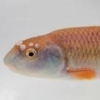Here's an odd one for you.
As indicated in the last thread I started I collected some black crappie fingerlings (1- 1.5" TL). The pond I collected them from is rather Eutrophic, and of course the crappie were located against the dense plant/"weed beds" near shore. This area has a thick layer of muck, 3" deep in some places. Plenty of leeches and other baddies. Some very small sunfish fry were caught in the same area, while those the size of the crappie were in different areas.
About half of the crappie fry collected had columnaris - mostly very early stages of "mouth fungus", to use the vernacular, while a few had more advanced lesions, saddleback, and fin rot. these were thrown back. Using the copious water changes/salt/cold tank temps I seem to have knocked it out w/o having to resort to antibiotics.
To get to the real question, none of the other fish in the pond caught by collection methods or angling seem to show any signs of columnaris (although I have caught no adult crappies). this would include common carp, blugill, pumpkinseeds, and largemouth. So I was wondering if crappie are more vulnerable to this disease. At first I figured it was the location the fry were inhabiting, but all of the juvie sunfish caught in the same area showed no signs at all.
Are Crappie more susceptible to columnaris than others?
Started by
Guest_IvanMike_*
, Aug 26 2011 08:55 AM
3 replies to this topic
#1
 Guest_IvanMike_*
Guest_IvanMike_*
Posted 26 August 2011 - 08:55 AM
#2

Posted 26 August 2011 - 09:47 AM
Not sure about crappie specifically, but we have talked a lot here about summer collecting being particularly hard on the fish... hot water, low oxygen, collecting stress (net or hook), handling, bucket stress, etc. Always better to collect in cool weather is you can... even if it means waiting and looking at an empty tank for a while.
Either write something worth reading or do something worth writing. - Benjamin Franklin
#3
 Guest_IvanMike_*
Guest_IvanMike_*
Posted 26 August 2011 - 10:43 AM
yeah I did consider that - so far the fish are doing really well. I was particularly interested just as no other fish I have seen in the pond display any signs of the illness. Perhaps the cats in the scientific discussion forum might have more insight. I did see in some crappie aquaculture literature that columnaris is an issue at times, so perhaps they might be a bit more susceptible.Not sure about crappie specifically, but we have talked a lot here about summer collecting being particularly hard on the fish... hot water, low oxygen, collecting stress (net or hook), handling, bucket stress, etc. Always better to collect in cool weather is you can... even if it means waiting and looking at an empty tank for a while.
#4
 Guest_gerald_*
Guest_gerald_*
Posted 26 August 2011 - 04:29 PM
Cant comment about their susceptibility to Flexibacter (columnaris) in the wild, but I've noticed that recently caught small crappie and fliers do seem more prone to it (than other sunfishes) in captivity. Lythrurus shiners are another group that seems to get overwhelmed quickly by Flexibacter, especially in soft, low-conductivity water. Salt in the collecting bucket seems to help.
1 user(s) are reading this topic
0 members, 1 guests, 0 anonymous users









